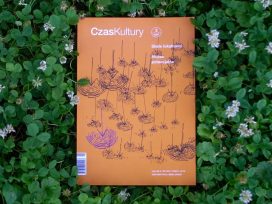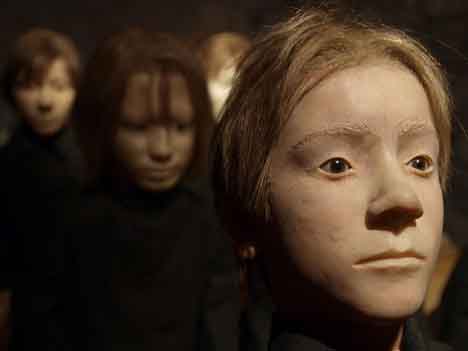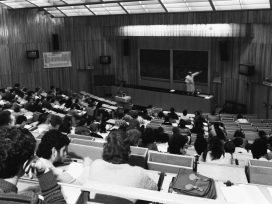
Neganthropology
Czas Kultury 2/2024
The politics and psychology of locality: on reviving local communities as high-tech expands and diversifies; forming networks against entropy; the Tortoise Strategy for caring; and rewriting life scripts.
This year marks the centenary of the birth of Tadeusz Kantor, the Polish painter, stage designer and theatre director. Kantor’s daughter Dorota Krakowska talks about how Kantor sought to end the taboo code that supported the erasure and denial of history in postwar Poland.
Lukasz Wojtusik: The 100th anniversary of Tadeusz Kantor’s birth is celebrated in Poland as “the year of Kantor”. What kind of experience is it to you, as the artist’s daughter? Difficult? Inspiring?
Dorota Krakowska: It is definitely difficult and interesting at the same time. But I wish it lasted longer than just one year. Then it could become an intellectually fascinating adventure. For me it is a time for assignments, duties and questions.

Tadeusz Kantor’s Cricoteka, Krakow, September 2011. Photo: Tomislav Medak. Source:Flickr
LW: What is the hardest part of this experience?
DK: Numerous artists find Kantor’s legacy inspiring. There are theatre plays and operas. I keep getting enquires about the use of his theatre scores. I am not certain whether Kantor would like that, to be honest. I need to make a decision for each request and reflect whether such actions are not an abuse of him as a person and his work. Is it really about getting to know Kantor more closely by those who have not had this opportunity yet? Or perhaps it is about something else, not necessarily in line with his way of thinking about art.
LW: Once a reformer, Kantor is now regarded as a classic…
DK: My professors from the Kraków Academy of Arts tried to convince me once that it is possible to separate classical art from the contemporary one. However, primitivism also made an important contribution to contemporary art. I’m not keen on such divisions.
LW: For Kantor the present and the past mingled on one stage. A journey into one’s own self was for him an attempt to bring back memories, something that, nonetheless, was subject to constant changes and negotiation.
DK: The point was a peculiar return to one’s own past; to the past of the place, but also to the manifestos created by his predecessors. In the twentieth century Marcel Duchamp gave us artistic freedom. With one single act he changed the way of thinking about art and its space. Artists have been faithful to these objectives.
LW: But space also played an important role in Kantor’s works…
DK: A characteristic feature of theatrical art is the limiting of the space and time continuum. Kantor approached this issue differently at different stages in his life. During the Second World War his theatre would touch upon social and political threats. And there was a time when Kantor was involved in a repertoire theatre, but the real breakthrough came with the establishment of Cricot 2.1 However, it was the year 1975 that marked the beginning of the most important thing, namely the theatre of death, which was followed by the theatre of love and death.
LW: It was already then that Kantor focused on memory and demonstrating how it works…
DK: Indeed, Kantor would build on his personal memory. He made use of the so-called “small room of imagination”. His experience of life and its surroundings were the most important. Out of these experiences he would build his own space on the stage. The play Today is my Birthday, the one he never finished, was supposed to point to a new phase in his artistic life.
LW: What do you think was special about your father’s artistic work?
DK: This question cannot possibly be answered with just one sentence. Why did Dead Class become world famous? Why were his subsequent theatre proposals so well received? Kantor was able to create a theatre in which the audience knew how to read the emotions he was using. He would talk about the history and tragedy of Poland and he would talk about the non-existent Galicia, a world that was destroyed during World War II. He focused on the people who passed away and the generation of witnesses and those crying for the loss. He explicitly referred to the already non-existent world of memory. After World World War II in Poland the time came for an erasure and the denial of history. In his work Kantor kept returning to this world and analysed this story. He would deliberately end the taboo code while not telling the story literally because he used metaphors with which his audience was familiar. Today his art is perceived in a totally different way.
LW: Where does this difference come from?
DK: One of the contemporary interpretations proposed by Marta Kufel, a theatre critic, states that Kantor created his theatre to fill the void that was left by the Jews and Jesus, the two empty places that remained after World War II. And indeed, Kantor was a witness of history in a multi-national country. Yet he was destined to live in a single-national and single-minded People’s Republic of Poland.
LW: And what is your memory in this regard?
DK: I do not need any memories at all. I simply have an impression that I still live in the pre-war Galicia. I’m still in a shtetl. Even physically I miss what I was not able to even know. I have an unspoken sentiment towards small Galician towns. It might be genetic memory or secondary memory. I cannot explain this.
LW: And you cannot possibly remember those places…
DK: It is quite bizarre that one can go back to memories of a period when one was not even alive. I should rather remember Warsaw where I lived as a child. However, I do not remember the communist times. Neither do I miss Warsaw. I am unable to dwell on the communist period when my father was artistically active and when I was young. I hate those times but I miss the pre-war Galicia.
LW: Not long ago, the International Cultural Centre in Kraków staged an exhibition, both in Kraków and in Vienna, which was titled The Myth of Galicia. It presented the remnants of the non-existent land in the mentality of the region’s inhabitants. Is this how you see Galicia?
DK: That is exactly the way I see it. Galicia is a state of mind. Sometimes it even drives me crazy. A good psychologist might explain this puzzle to me. What is the origin of my longing for a place that is not based on a real experience?
LW: What would Kantor say looking at you today?
DK: I believe he would reprimand both me and others who are responsible for preserving his legacy.
LW: Are we doing too little?
DK: A far better space for the understanding and contemplating his artistic work could have been created. I feel guilty in this regard although I do not have access to everything that is related to his legacy. Neither do I have the time to control it all. Kantor himself was not only an artistic genius beyond any comparison but also a great manager. He was great at organising the space for his artistic work and finding a way to have it funded. Today, young people learn these skills at universities, whereas Kantor was a manager who was using his intuition and instinct.
LW: During his plays Kantor would often reorganise and change the surroundings. Was his behaviour similar off the stage?
DK: I lived with him only for a short time when I was very little. I think he felt life needed theatricalization. The private sphere would overlap with the aesthetic one. Ordinary events were treated with the same importance as extraordinary ones. Even having a cup of coffee was a ritual. Breakfast was an event too, while silence was a staged silence.
LW: Was it possible to have a normal conversation with Kantor?
DK: It was but it was always an unusual experience. Every meeting with him was some kind of celebration.
LW: Was it possible not to give in to it? In his plays the actors seem to live with him in a bizarre symbiosis as if together they were celebrating the theatrical journey.
DK: It was difficult not to give in. It was an absolute symbiosis preceded by many months of preparations. Was it possible not to give in to Kantor? This man had an amazing charm and some magic around him. I loved meeting him even in the street. What I disliked though was coming to Cricoteka.
LW: Why?
DK: There was a specific atmosphere. Everyone was important.
LW: So meetings on the street were safer for the relationship you had with your father?
DK: Even on the street I could not help but notice his charisma. He was full of positive energy. I could be a hundred metres away from him and I would still sense it. He was a man who stood out.
LW: I can sense some passion in this story about your father…
DK: Because he was a great man. Now I have been watching a great number of his plays and rehearsal footage. I have been reading about him and for the first time since his death I have felt overcome with grief.
LW: You can feel his absence.
DK: After his death mum would often tell stories about Tadeusz. She would watch his plays. It was because of him that she wrote the book which I helped put together. And then mum passed away. When celebrating the year of Kantor in Poland I have felt his absence to the core for the very first time. And it makes me sad.
LW: What have you gained by being his daughter?
DK: I have gained a great love for the arts and artists, not the ones seeking a successful career, but the uncompromising artists. I also found a great love for theatre and the visual arts. It is because of him that I have that infinite love for the Galicia that ceased to exist so long ago.
LW: And what have you lost as Kantor’s daughter?
DK: The opportunity to work in the theatre. I studied at the Fine Arts Academy in Kraków even though I kind of felt held back, being aware of the fact that I will not be as good as Kantor or my stepfather, the great stage designer Wojciech Krakowski.
LW: Were you held back from the inside or the outside?
DK: It was from the inside. However, I would also hear things like: “Give up on theatre; you will not succeed.” I reflected on these opinions and accepted them. But I kept doing my job.
LW: It seems to be a problem that many children of famous artists have to face. They choose a career path similar to the one their parents walked through.
DK: And most of them are affected by something we could call an artistic or environmental block. It has nothing to do with their abilities or skills.
LW: Did Tadeusz Kantor devote himself to anything else other than the arts?
DK: When Tadeusz was given a choice between taking care of me or his art, he chose the latter. When I have things to do and get some questions about Kantor I always end up dealing with Kantor, it is a bizarre kind of loyalty.
Cricot 2 was a Polish experimental theatre company based in Kraków founded in 1955 by Tadeusz Kantor. Productions were initially based on dramas by Stanislaw Witkiewicz (Witkacy) but later plays were genuine creations of Tadeusz Kantor himself.
Published 23 September 2015
Original in Polish
Translated by
Justyna Chada
First published by New Eastern Europe 5/2015
Contributed by New Eastern Europe © New Eastern Europe / Eurozine
PDF/PRINTSubscribe to know what’s worth thinking about.

The politics and psychology of locality: on reviving local communities as high-tech expands and diversifies; forming networks against entropy; the Tortoise Strategy for caring; and rewriting life scripts.

Expectations, standards, and requirements in higher education vary from country to country. In the third episode of the Knowledgeable Youth podcast Ukrainian students embark on the complex subject of tertiary education.